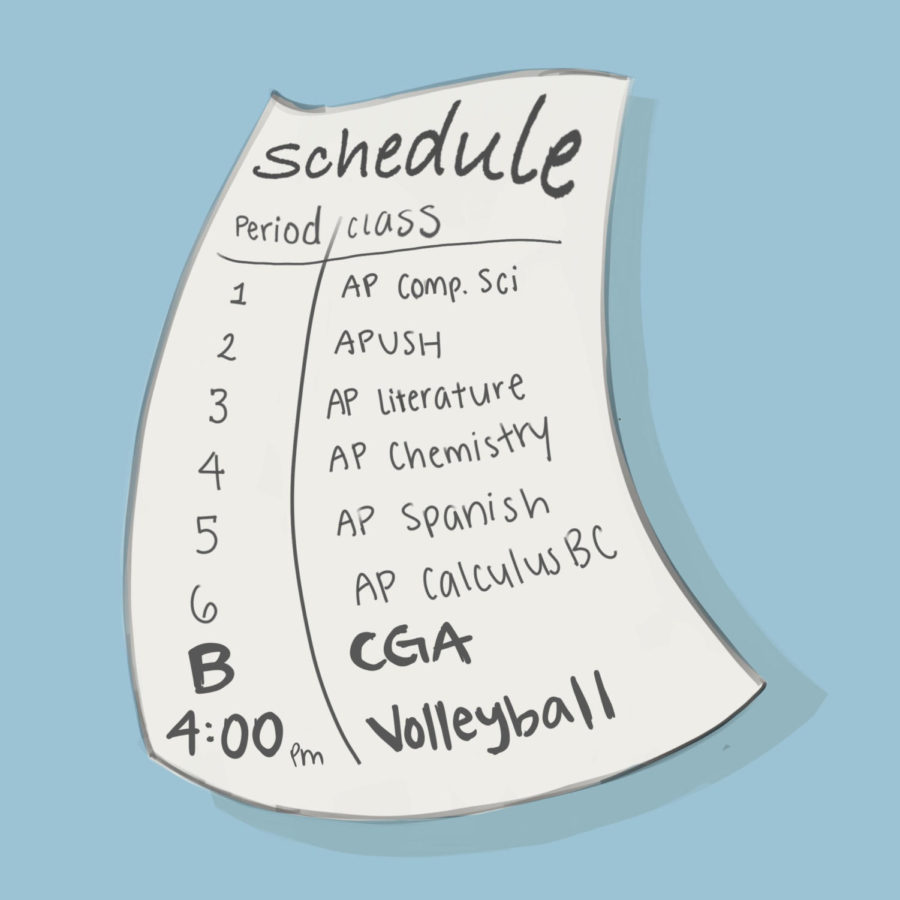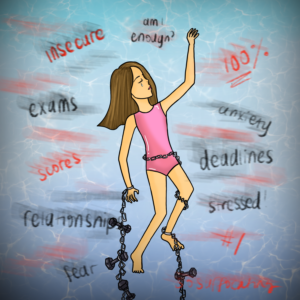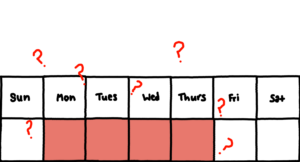Student athletes adjust to the new bell schedule
Athletes who have a B-period schedule learn to balance both school and sports.
October 16, 2022
Before the start of the 2022-23 school year, San Ramon Valley Unified School District (SRVUSD) proposed a new bell schedule to accommodate California Governor Gavin Newsom’s 2019 mandate that high schools can start no earlier than 8:30 a.m., which went into effect this school year. Under Dougherty Valley’s new schedule, first period begins at 8:30 a.m. while B-period ends the school day at 3:41 p.m. on Monday, Tuesday and Friday. Wednesday and Thursday end at 3:00 p.m. and 3:45 p.m., respectively.
Following the new schedule, students in the district have been slowly adjusting to these changes as classes and activities, such as sports and clubs, have been pushed back to later in the day. However, as fall sports practices and games have started to pick up, student athletes have had to take more drastic steps in accommodating the changes in their busy schedules.
With sports starting later in the day, these students are expected to learn to balance the amount of time and effort spent on school and sports while still finding time to rest, socialize, and look after their mental health.
Junior Niharika Bangalore, a runner on the DVHS cross country team, takes periods 1 through B and believes the bell schedule has not been in her favor regarding how well she manages her time between sports and academics. Although the new schedule may appeal to many students as it is set to provide additional time for sleep, student athletes like Bangalore don’t exactly agree.
“Because everything is pushed back with school being longer and [starting] later and sports [starting] later, it’s mostly just the fact that even though I’m waking up at the same time as I normally would have, I’d have to stay up later to work because of the adjusted schedule,” Bangalore said.
But it’s not just Bangalore who has to move around her day and adapt to these changes. In order to best accommodate the push-back of timings and consider the students, the cross country team has found a solution to the problems: morning practices. However, Bangalore doubts the actual efficacy of morning practices to the students.
“We have morning practices, but it isn’t fully effective because I keep staying up the same amount of time and sleeping the same amount of time,” she said. “So I was cutting my sleep every time because of this new schedule.”
Staying up later to finish assignments impacts the amount of energy needed to perform well in sports, which then creates an imbalance between focusing on further progressing in their sport while still maintaining proper grades at school.
DVHS Counselor Rajni Nijjer provides an insight on the impact the new schedule has on sleep and how the problem of lack of sleep may continue to stand.
“The problem [last year] was that school was early and students weren’t getting enough sleep and that was impacting their health, mental health, and activities. Now it’s potentially pushing the problem to later,” Nijjer said.
Bangalore agreed, expressing her concerns about her physical health due to the lack of time and sleep she’s getting in a day.
“Sleep is an important factor to recover and let your body rest up. When you’re getting fewer hours of it, you don’t get as much time to recover. So I’m always sore, I’m always so tired and my body never gets to recover,” she said.
However, not only is the lack of sleep due to the new schedule impacting her physical health, but it’s taking a toll on her mental health as well.
“This year is a lot more difficult mentally just because I have less time for myself,” she said. “And whatever time I do have, I feel like I’m always spending it on school, which is mentally draining just because it’s challenging at times.”
Despite the new bell schedules impacting the expected timings of practices and matches, other student athletes, like senior Sarah Tan, feel differently. Tan, one of the captains of the DVHS varsity women’s volleyball team, only takes five classes this year, which gives her extra time between school and practice.
“[Last year], there was barely any time to do work at home,” Tan said. “But this year, I have a lot more time to myself because of such a big gap [between school and volleyball]. I have more time to relax, focus on myself and then I can go to practice and focus on playing well.”
Subsequently, Tan finds herself taking advantage of the delayed timings and putting full use to one of the benefits of the new schedule: more sleep. Tan’s ability to get a good rest almost every night has been affecting her mental health positively.
“Taking more time to myself has been improving my mental health. Because then I feel like I have a lot more time to get stuff done,” she said. “I don’t have to worry about everything I have to do after practice. So then, it gives me more time to focus on volleyball.”
With contrasting perspectives and opinions about the new schedule, Tan and Bangalore represent the negative and positive sides of the changes in student athletes personal schedules. However, these opinions vary from student to student as Nijjer explains, “It just depends on the student and what their schedule is, [including] how many classes they’re taking and what they’re involved in outside of school.”
In the future, Nijjer suggests that student athletes should spend more time figuring out how to get a good night’s sleep while balancing their workload with sports practices.
“The best way for students to manage their time is to figure out right where in their day they can best utilize the time,” she said. “Prioritizing where you can fit in your schoolwork and how you can be more efficient with getting some of your work done is a challenge but [it] helps you stay on top of it.”







